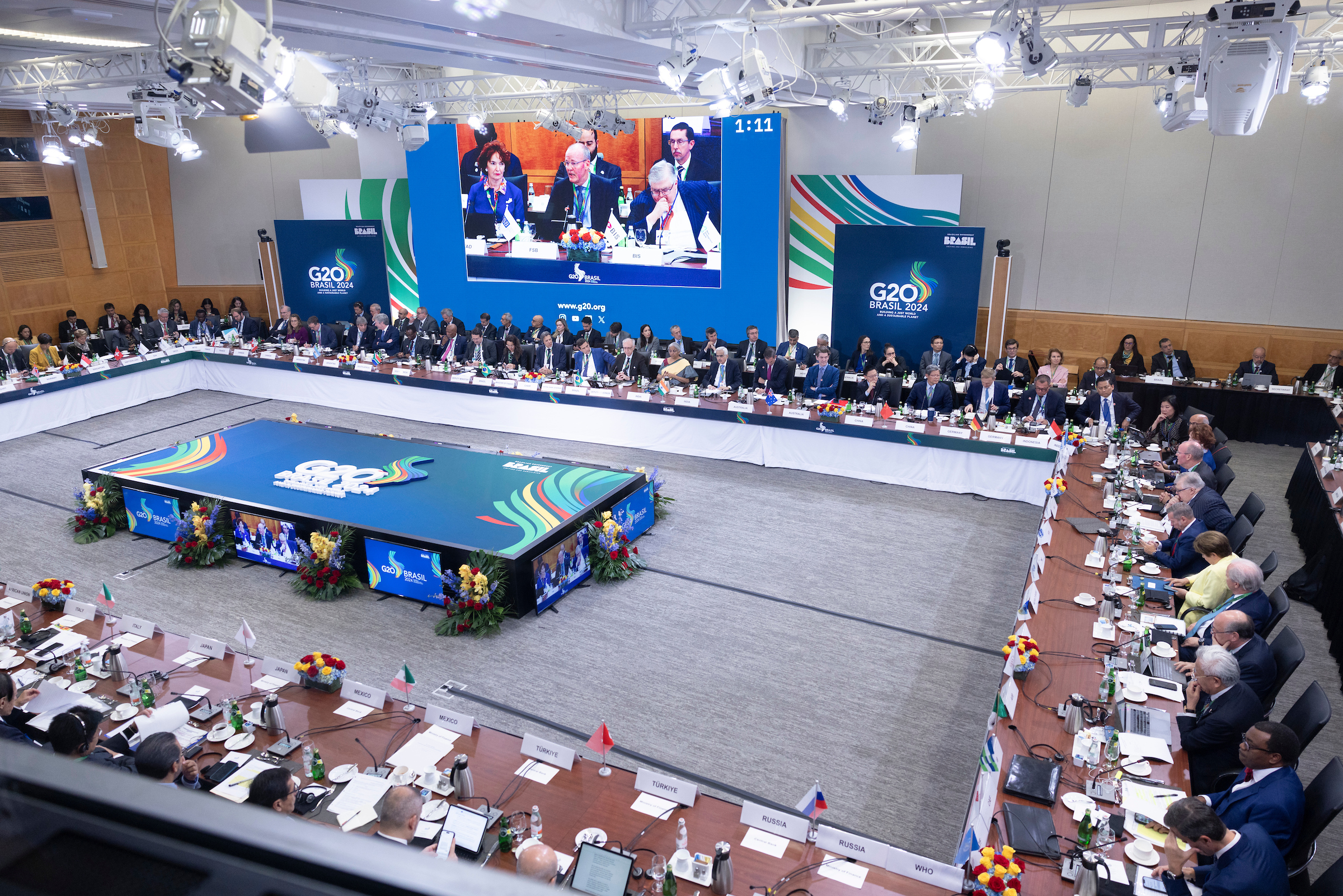This year, the Annual (autumn) Meetings of the World Bank (WB) and of the International Monetary Fund (IMF) were characterised by a general sense of expectation due to uncertainty over the outcome of the US elections and the geopolitical stalemate caused by the conflicts in the Middle East and Ukraine.
Fixing the global economic safety net: tentative steps forward
The IMF Managing Director Kristalina Georgieva opened the Annual Meetings by describing the combination of low growth and high debt as ‘lethal’ for the global economy. Developing countries, meeting in the G24 and V20 political groupings, utilised the Annual Meetings to reiterate their demand for a substantial strengthening of the global economic safety net and for measures to mobilise more climate finance. This demand has largely gone unheard. The few steps taken in this direction included: Spain’s announcement to increase its contribution to IDA21 (International Development Association) by 40%; the implementation of measures by the WB to increase the International Bank for Reconstruction and Development’s (IBRD) lending capacity by $150 billion; the adoption of a reform package to refinance the IMF’s PRGT (Poverty Reduction and Growth Trust), which offers loans to the poorest countries at low interest rates; and the reduction (but not abolition) of surcharges for countries that are late in paying their instalments to the IMF. These measures will increase the amount of concessional finance for developing countries, but only marginally compared to actual needs, while continuing to treat high levels of debt and debt costs as a short-term liquidity problem.
The solutions proposed by the WB and IMF focus on three pillars:
- structural reforms and mobilisation of internal resources;
- external financial support to developing countries;
- ad-hoc actions to reduce debt service burdens on a country-by-country basis.
The limitation of this approach is that it doesn’t tackle the reduced ability of the global debt architecture to adapt to current challenges, as instead demanded in the recent UN ‘Pact for the Future‘. In view of the Fourth International Conference on Financing for Development (FfD) to be held in Spain in June 2025 and the upcoming Christian Jubilee celebrations, several organisations have made more radical proposals such as the adoption of a UN Framework Convention on Debt and its Restructuring. In addition, it was also proposed that climate risks and necessary investments be taken into account in the revision of the IMF’s Debt Sustainability Framework (DSF) methodology scheduled for 2025.
After the Annual Meetings, reforms of Multilateral Development Banks still at the centre of G20 discussions
Brazil obtained the adoption, at the G20 level, of a Roadmap outlining a series of recommendations to make Multilateral Development Banks (MDBs) ‘better, bigger and more effective’. No decision has been taken, however, on the front of the recycling of Special Drawing Rights through the MDBs, a tool that would expand their lending capacity at zero cost. Despite the proactive role of the African Development Bank and the Inter-American Development Bank and the favourable decision of the IMF, no country has yet come forward.
Brazil pushes the climate finance debate at the G20
Some relevant developments were seen in the meetings of the G20 Finance Ministers, for the first time accompanied by the ministers responsible for the climate agenda in the discussions of the Climate Task Force. The outcome documents recognised the need to develop macroeconomic policies that take climate variables into account, a paradigm shift in the definition of national transition plans. The Climate Task Force highlighted the usefulness of country platforms for accelerating climate action and attracting finance, reinforcing the need for a more collaborative and structured approach to Transition Plans, involving governments, regulators, financial institutions, the private sector and civil society. The work of the Task Force was accompanied by a report, coordinated by Mariana Mazzuccato and Vera Songwe, which proposes a strategy for promoting sustainable growth in the G20 and globally, based on aligned green industrial and financial policies supported by global governance structures that prioritise equity both within and between countries.
The Sustainable Finance Working Group (SFWG) commissioned a report proposing a set of measures to optimise the work of international climate and environmental funds and align them with other sources of climate finance. The 2024 G20 Sustainable Finance Report also introduced guidelines for the development and implementation of transition plans, proposing a set of standards to ensure the interoperability of plans between financial institutions and companies. Although these measures remain voluntary, there is clear recognition of the need for a systemic and coordinated approach to mobilising the financial resources required for the transition.
Brazil will have the opportunity, as COP30 chair, to pick up the threads of the interrupted discourse, after COP29 has defined the new climate finance target (NCQG).
Photo by IMF Photo









